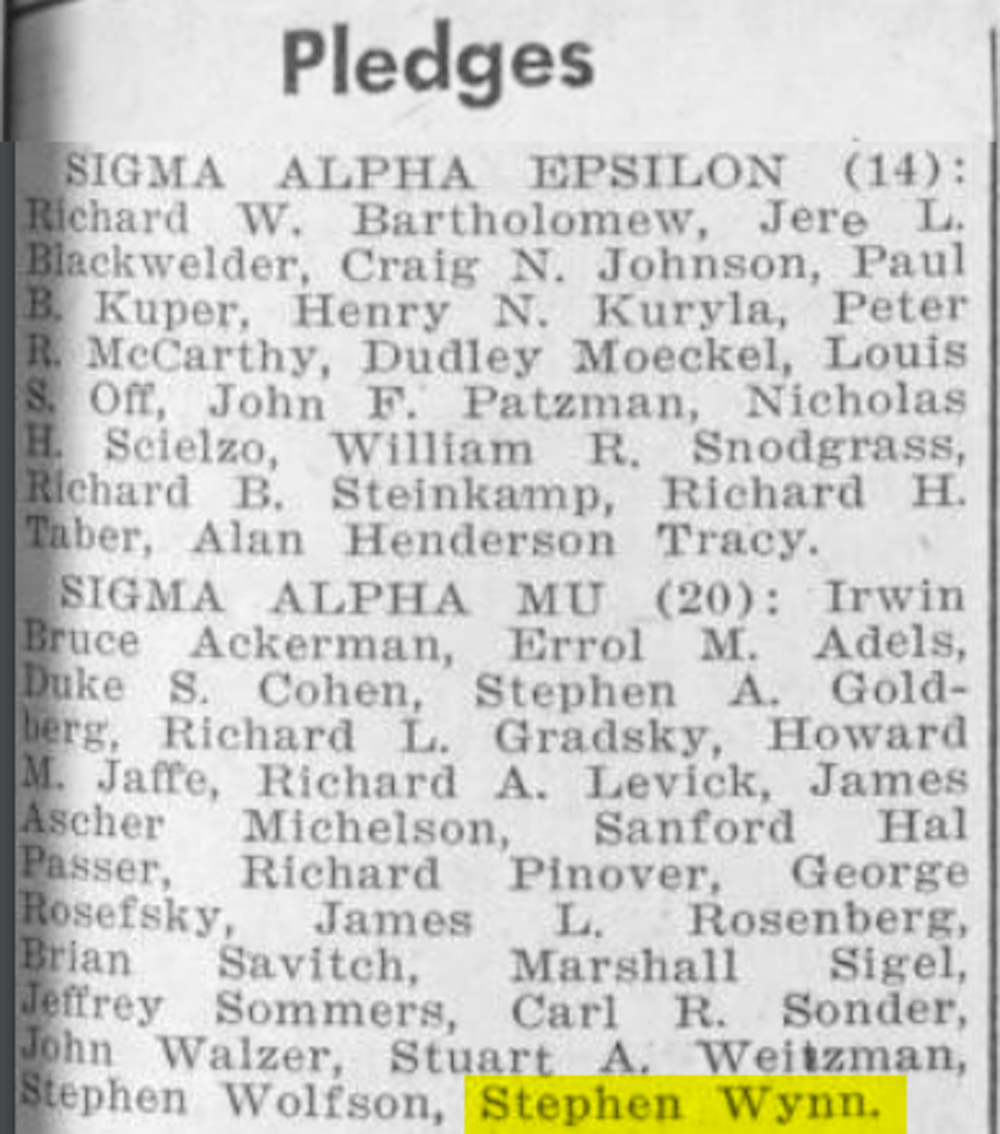
Screenshot // Youtube
Penn revoked Steve Wynn’s honorary degree and removed his name from campus, as well as from a scholarship on Feb. 1, eliciting fierce debate and widespread difference of opinions among members of his graduating class.
Penn’s decision came several days after Wynn’s resignation as the Republican National Committee finance chair, and five days before his resignation as CEO of Wynn Resorts.
The Daily Pennsylvanian interviewed dozens of members of Wynn’s graduating class to investigate who Wynn was at Penn and to gauge how the Class of 1963 has reacted to the scandal engulfing one of their most notorious classmates.

For 1963 Wharton graduate Robert Aresty, the University’s decision to strip Steve Wynn of his honorary title and spot on campus is a deeply misguided one.
“I think to take his name off of anything he’s given to Penn would be a dramatic mistake,” Aresty said.
Wynn started school at Penn in the fall of 1959, and graduated in 1963 with a degree in English. Shortly before his graduation, his father passed away, leaving behind $350,000 in debt, which led Wynn to decline his offer at Yale Law School and take over the family business.

Aresty, a friend of Wynn's at the time, recalled him in a positive light — how Wynn showed courage during a difficult time in his life and dedication to the school.
“I do remember just when we graduated his father passed away and he went back to run the family business,” Aresty said. "I remember he hired two or three guys from our class that fell on hard times. He really went out of his way to help classmates who needed help.”
Others in the Class of 1963 who were less close to the casino mogul are split over whether Penn acted appropriately in distancing itself from Wynn.
Many members of the Class of 1963 agree with Penn’s decision to remove Wynn’s name from Penn’s campus and legacy. Many cited the growth of the #MeToo movement — victims of sexual abuse have sharing their stories — as a factor that influenced their support of Penn’s decision.
According to Bill Boggs, 1963 College graduate and media personality, the wave of sexual assault victims coming forward has been eye-opening and has caused society to take allegations more seriously.
"What's interesting is how rapidly these changes have occurred since the Harvey Weinstein case,” Boggs said. “There has been an avalanche of accusations and an avalanche of changes, largely in the creative community.”

1963 College graduate Richard Bartholomew said he has faith in the University’s decision-making process and noted the nationwide movement of people in power being held accountable for their actions.
“This is a phenomenon that is going on all over, on many campuses for many different reasons,” Bartholomew said. “I'm not surprised the University did what it did.”
Several alumni said they support the University’s decision as they do not think Wynn’s alleged actions reflect the values of Penn.
Wharton alum David Ferber referred to Penn as “an institution of integrity,” and said continuing to honor Wynn would throw “a little stain on that integrity.”
Supporters of the decision also drew connections between Wynn and Donald Trump. President Trump, a 1968 Wharton graduate, has also been accused of sexual misconduct. Wynn became the RNC finance chair after Trump’s election.
“I also hope that no honors or recognition be given to the Wharton student now occupying the White House,” 1963 College graduate Jere Blackwelder said.
The distinction between criminal charges and allegations was a major theme brought up by those who disagreed with Penn’s decision. Many of these Penn grads did not have close relationships with Wynn yet still opposed the measures taken, which they saw as a legal injustice.
1963 Wharton graduate Burke Asher said Penn’s decision reveals a lack of belief in due process, a fact that ultimately “doesn’t surprise” him.
“The University has been that way in the past. In the current environment it’s just fashionable to take someone down without the process completing itself,” Asher said.
For 1963 College graduate Marcel Jean Arrouet, Penn’s decision to revoke Wynn’s honorary degree and erase his name was reminiscent of the Duke University lacrosse case, where members of the lacrosse team were falsely accused of rape.
“A guy should be reprimanded if he has been proven guilty of charges,” Arrouet said.
Another common criticism of the University’s decision was the accelerated timeline of the events — 1963 Wharton graduate William Englesbe categorized the decision as “premature.”
“I despise these knee-jerk reactions,” Englesbe said.
Other graduates noted Penn’s misogynistic culture in that era, and described Wynn as a product of his time.
“The atmosphere at Penn was super sexist — it seemed the goal of every undergrad was to find a woman and go all the way with her, and after that her reputation was ruined,” 1963 College graduate John Berry said. “This permeated the whole culture at Penn, and Trump and Steve Wynn were perfect exemplars of the culture.”
The Daily Pennsylvanian is an independent, student-run newspaper. Please consider making a donation to support the coverage that shapes the University. Your generosity ensures a future of strong journalism at Penn.
Donate




